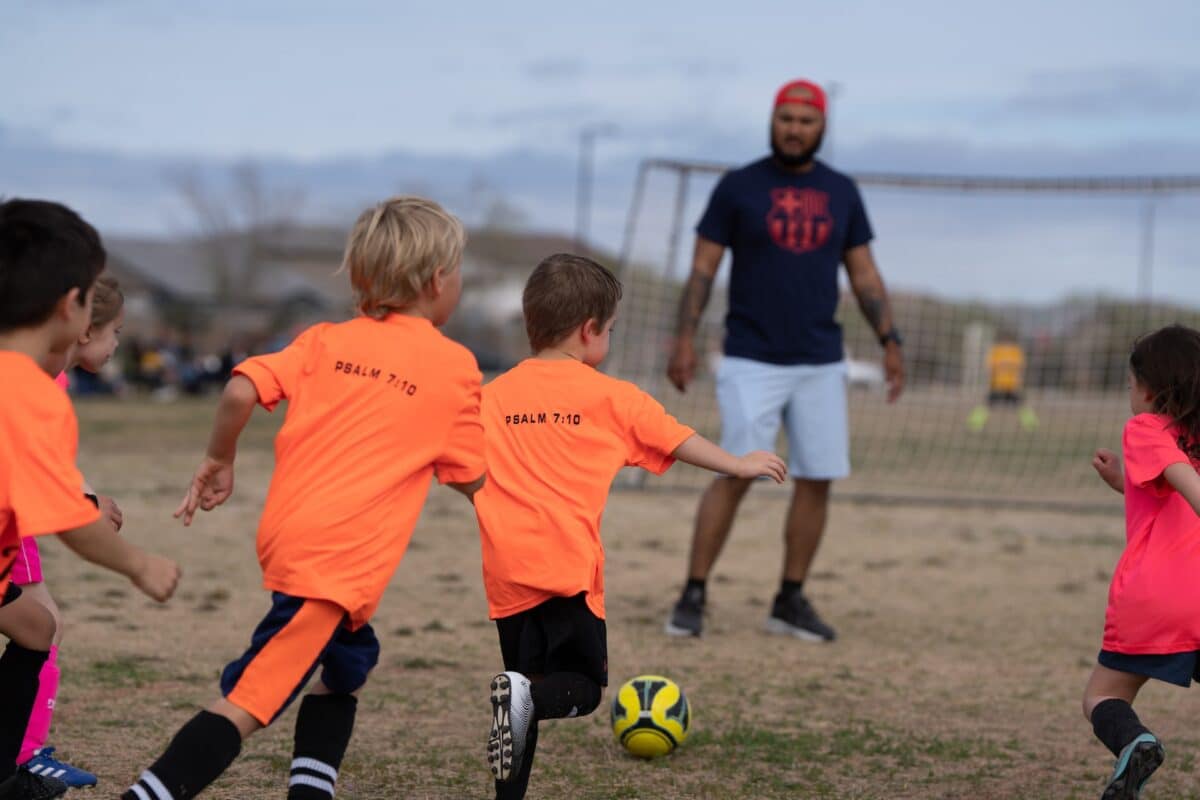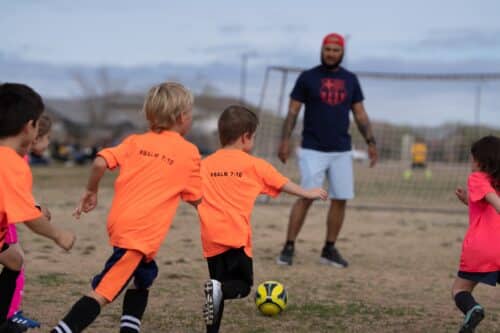
Wait, what? When has a religious writer ever had anything good to say about youth sports in America? I promise this is not a bad attempt at a “clickbait” headline. However, like a psalmist in a song of lament, I will spend approximately three-quarters of my time railing at the system before I turn to hope at the end. So, hang with me, I will get to the gift.

Sarah Blackwell
I remember the first day that I hated the youth sports machine. I refer to it as the youth sports machine because there is nothing inherently wrong with kids playing games. In fact, it is wonderful. It is the adults who have gone out there and corrupted the beauty of the thing. Sports at their best provide exercise for the body, teach the basics of teamwork and time management, and help young people feel like they matter by being part of something bigger than themselves. Then money, status, a lack of boundaries, and fear get involved and make a mess of the whole thing.
My story begins one spring weeknight with my kindergarten son playing in a baseball game. My son’s scrappy team beat one of the top teams in their rec league. The other coach was livid. So, after an hour warm-up and an almost two-hour game, he sent his team of five and six-year-olds to run “poles” (back and forth along the whole outfield from foul pole to foul pole) as a punishment for their “poor” play. It had to have been almost eight o’clock at night, and the kids were exhausted after being in school all day followed by three hours of baseball. I could not believe that anyone accepted this punishment for kids who rode in booster seats to the game, enjoyed juice boxes, and probably slept in pull-ups at night. They were far too young to be subjected to this type of expectation around sports.
Earlier in that same game, I had gotten into a conversation with a parent who basically told me that my 5-year-old really needed to play year-round travel ball if he ever wanted to play at “the next level” (whatever that meant). In a single day, I went from joyfully watching my son play a sport he loved to wary of the harmful messages he was going to encounter if he kept playing sports. For some families, they have an intentional goal of their kids playing at the collegiate level or beyond and that is fine if that is the “north star” for their family. What I am more concerned about are all the others that get sucked into the machine out of fear of falling behind and are not really making conscious decisions about what they put of utmost importance for their own family.
Yes, youth sports teams can form remarkable communities (I mean you are together all the time). However, what happens when your child does not progress as rapidly as their peers or is a late bloomer in middle school and gets cut from their selective team? Now their whole sense of community and belonging is tied to them being worthy. You must frantically search for another place to play, but everyone else has already formed their own little communities and spaces are a limited commodity. Not everyone is welcome.
Yet, every night in cities across America, parents are stressed out trying to find a way to manage getting off work, feeding children, getting to practice, and managing homework only to return home exhausted at the end of the day. Throw in some physical therapy for the players’ overworked bodies that have had no time to rest in the off-season because there is no off-season. Then, these families will get up the next day and do it all over again.
The list of grievances by the church against the youth sports machine is long. There is no money to tithe, but there is money to travel several weekends of the season, pay high registration fees, and afford the most expensive equipment just to try to keep up with the other players. [Note: If one invested the $300 a month spent on travel sports starting when a child was six at a 6% interest rate one would have over $63,000 for college]. Attendance in church drops as families attend travel tournaments and weeknight practices. The cohesion of seeing each other and knowing our daily struggles and challenges is reduced to a quick catch-up session if the Sundays both people are there happen to line up. It has even been blamed for an entire generation of churchgoers (the Millennials) to be absent from houses of worship. Their parents (under pressure from the society around them) “told” them that regular community was not important to the life of faith by not holding the line against the crush of youth activities on Sundays — especially Sunday mornings.
As a religion teacher at the collegiate level, I hear the same story repeatedly from my students. They went to church a lot when they were little, but then they started playing sports and traveling on the weekends, and they just kind of stopped going. There is no malice or anger toward the church — just simply an indifference born out of a lack of exposure in their formative years. Essentially their faith formation closes at around the fourth or fifth grade level. Unfortunately for the ones who get cut or bored of whatever has been dominating their time, rejoining a church context can be difficult, as those peers who stayed are more advanced in their “faith language” skills and have already developed relationships that have been around for years.

Photo by Matthew Osborn on Unsplash
Ok. So, here’s the big reveal. What gift could youth sports have for our churches? The gift of the youth sports machine is that it can now be the place where kids learn hard work pays off, your “stats” are important, and your merit is based on your performance. Let them learn conditional favor there, and free the church from the meritocracy. The church can now be the place it was supposed to be all along — a place where you are accepted, loved, honored, and treasured just how you are. Your worth here does not have to be tied to how you perform.
In the past, church was a place where you had to measure up to certain standards to be accepted. Children and youth were handed little envelopes to bring an offering and check off whether they had been on time or said a prayer or brought their Bible or invited a guest. Systems of merit abounded where children earned their accolades in the church context through their performance. For many that grew up in a church environment where it was all about following a lengthy set of rules, experiencing shame when you made a mistake, and being glorified for being perfect, you can go get all those things in youth sports and not have to look for them at a church.
In the book, “Never Enough: When Achievement Culture Becomes Toxic — and What We Can Do About It” by Jennifer Breheny Wallace, she notes that one of the key indicators of mental health and well-being among teens is a sense of mattering: “High levels of mattering act as a protective shield buffering against stress, anxiety, depression, and loneliness.” Unfortunately, we have scrambled to meet this need by providing them outlets to “prove themselves” and, thus, why they matter. Where several decades ago a school or recreational sports team might have allowed a student to matter just for being there, that is no longer the case. It is just one more place where they are judged by how well they can perform. True mattering, though, must be based on knowing that we have worth for who we are at our core, our unique true self, stripped of any accomplishments.
So, enter the church as a refuge — maybe the only place where students could feel like they matter without performance. Through the years, my boys have been cut from a team or two, but they could always go to church and share with their support system. Adults and peers would lament with them, encourage them, and reassure them that their care had nothing to do with their ability to hit a little ball. They knew they had a place where they mattered.
We have got to make it happen intentionally, though. Can we affirm and celebrate the young people of our congregations for who they are? Can we be a haven for our teens who spend their lives constantly being judged on what they do, how many friends they have, or how they look? Can we find out what they are interested in and learn more about it so we can talk with them? Can we encourage their participation in authentic ways? Can we offer counter-cultural recreational programs to put sports back at the right size and scale? Can we reach out to all the parents who invested heavily in the lives of their children and, now that they are grown, need a place to connect again? What if we actively sought out empty nesters with a welcome that celebrated who they were apart from their parental roles? Can we help them rejoin without shaming their prior decisions? Can we help young families with preschoolers discern the right boundaries for their families with regard to extra-curricular participation now and then help them stick to that when the pressures start rising? Can we help young adults floundering for a place to belong now that they are out of the youth sports world? I think we can. We just have to open up our present.
We can be the mattering place.
Sarah Blackwell is a contributing writer at Word & Way and a 2020 graduate of the Gardner-Webb School of Divinity. She teaches in the Religion and Philosophy Department at Wingate University and is a D.Min. student at McAfee School of Theology. She has coached a variety of youth sports including soccer, basketball, cross country, and track. Her intergenerational faith formation book, God is Here is available through Amazon and other online book retailers. Follow her writings at www.proximitytolove.org.






